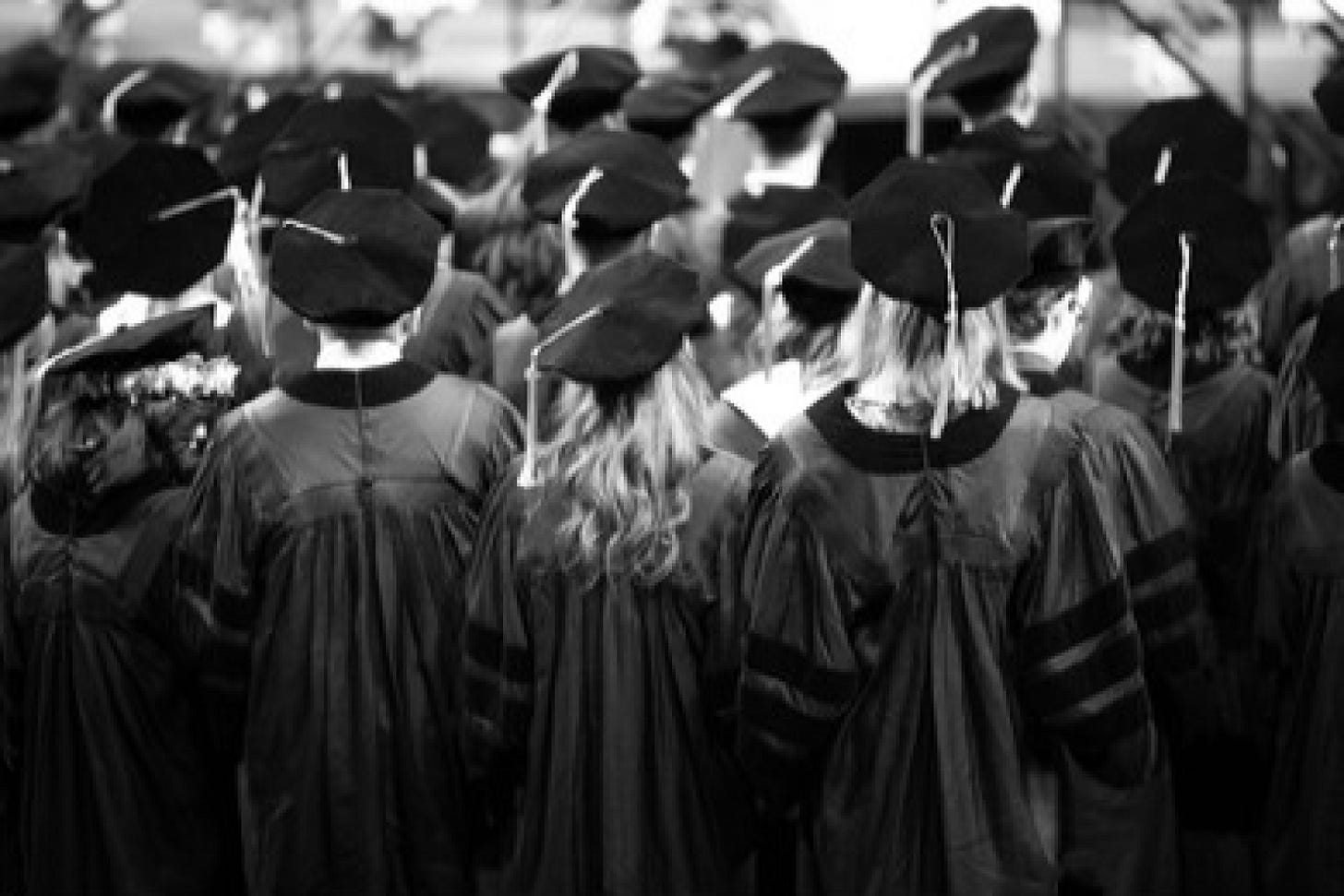E-Pluribus | January 23, 2023
Why colleges shouldn't get political; the politics of school discipline; and discrimination by universities is wrong regardless of the intent.
A round-up of the latest and best writing and musings on the rise of illiberalism in the public discourse:
George F. Will: When Colleges Take Political Positions, They Show Who Isn’t Wanted
Higher education is often billed as an opportunity for young people to have their beliefs challenged by hearing many different points of views across a broad range of disciplines. George Will at The Washington Post says universities are putting their thumbs on the scale by yielding to the impulse to weigh in on political and cultural issues which puts undue pressure on students to conform.
Academic intellectuals, who often are the last to understand things, seem unable to fathom this: They might be taken more seriously if they did not take themselves so seriously. Which is why it is in their interest to stop the spreading practice of having colleges and universities make pronouncements to the nation concerning particular political issues. And compelling applicants for faculty jobs or promotions to pledge allegiance to political agendas.
[ . . . ]
In 1967, when many campuses were inflamed and the University of Chicago was under internal pressure to announce opposition to the Vietnam War, the university produced the Kalven Report, which said campus free speech and the academic mission depend on a “heavy presumption” in favor of institutional neutrality regarding political matters:
“The instrument of dissent and criticism is the individual faculty member or the individual student. The university is the home and sponsor of critics; it is not itself the critic. … There is no mechanism by which it can reach a collective position without inhibiting that full freedom of dissent on which it thrives … if it takes collective action, therefore, it does so at the price of censuring any minority who do not agree with the view adopted.”
More pervasive and sinister than institutions taking collective political stances is their policy of requiring applicants for faculty positions to express enthusiasm for a political agenda. In 2021, the American Enterprise Institute found that 19 percent of colleges and universities require applicants to submit DEI — diversity, equity and inclusion — statements affirming support of, and sometimes promising activism on behalf of, various race-conscious pedagogies and other policies. An American Association of University Professors survey found that 21.5 percent of such institutions take “DEI criteria” into account when awarding tenure, and 50 percent are considering it. This is a mechanism for producing institutions so politically monochrome that they can comfortably make political proclamations without worrying about what a vanishingly small minority of dissenters might think.
Read the whole thing.
Daniel Buck: The Coming School-Discipline Wars
In some places, public schools still practice corporal punishment, but in many others, the pendulum has swung far in the other direction. Without wading into the matter of corporal punishment, Daniel Buck writes at National Review that the debate over school discipline is likely to get more heated and that conservatives have an opportunity to make the case for cracking down on the disruptors.
Earlier this month, the teachers union in Akron, Ohio, reached a deal with the district to avert a threatened strike. Lost in coverage of the deal was a peculiar sticking point that had held up the negotiations: Changing the definition of “assault” to replace the word “contact” with the word “injury.”
[ . . . ]
The district’s attempt to alter its behavior code is part of a growing trend in districts across America. Where national headlines feature debates over the abolition of police or bail reform, the same ideas behind such progressive movements are percolating through American education, manifesting in reductions in suspensions and expulsions, loosened behavioral expectations, the removal of school-resource officers, and other unwelcome changes.
[ . . . ]
Conservatives will argue from a strong position if they take up this debate. Trendy, progressive approaches to student discipline have proven disastrous, leading to deteriorating academic performance, increased class disruptions, more bullying and truancy, and spikes in violence. Conservative governors and school-board members have won seats defending school choice and battling progressive politics in the classroom. They could find similar success defending discipline in schools. They may even be surprised as teachers nod along in agreement with them.
Read it all.
Adam Kissel: Universities Are Not Colorblind—That’s a Big Problem
To hear most modern-day civil rights activists tell it, Martin Luther King’s reference to the “color of [his children’s] skin” in his I Have a Dream speech was more like a pipe dream. Writing for Minding the Campus, Adam Kissel says, however, it’s not just a dream and in fact is the only correct and constitutional answer to how universities should operate, a goal many schools are still working against.
In terms of equal access to college programs [under Title VI of the Civil Rights Act of 1964,] colorblindness is the rule. That’s the opposite of what we see in these programs. Take a close look, for example, at Indiana University (IU) from the perspective of a graduate student in a STEM field.
IU runs the I CAN PERSIST STEM Initiative for “graduate women of color” (implicating not just Title VI but also Title IX due to discrimination on the basis of sex). This is part of a nationwide I CAN PERSIST initiative limited to “women and girls of color.” IU’s Department of Chemistry lists the program on its diversity programs page. If you’re, say, a white male, then none of the persistence program’s resources are open to you.
But that’s not all. A university also violates Title VI when it supports discriminatory student organizations. IU’s Black Graduate Student Association (BGSA), like hundreds of similar organizations across academia, is dedicated to supporting “[b]lack graduate and professional students.” It’s clear that BGSA is just for black students: “we [are] dedicated to fostering community amongst ourselves,” BGSA says (emphasis added). It goes without saying that the university supports no equivalent club for white graduate students.
Read it all here.
Around Twitter
Excerpts from a thread by the Foundation for Individual Rights & Expression’s Aaron Terr on free speech culture:
From Reason’s The Facebook Files, how much “coordination” between government and private companies to weed out “misinformation” is too much? Kmele weighs in:
And finally, Thomas Jefferson’s original phrasing was a little wordy anyway, right?








